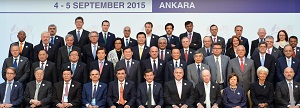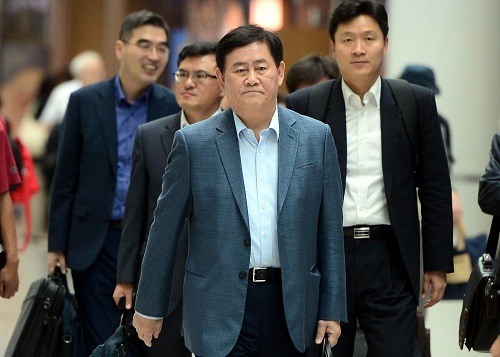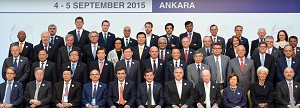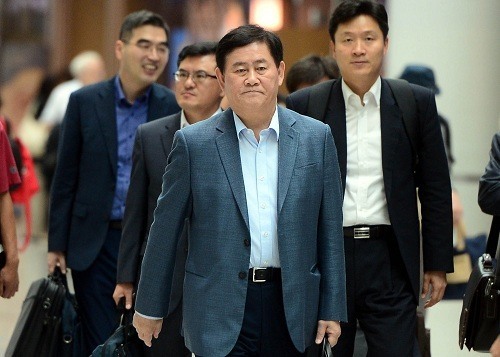 이미지 확대보기
이미지 확대보기G20는 회의를 끝내면서 공동성명을 채택했다.
영어및 번역 전문 별첨.
G20는 이 성명에서 글로벌 경제 불안에 공동으로 협력하면서 적극 대응하기로 했다.
G20 Finance Ministers and Central Bank Governors Meeting
Ankara, Turkey
1. We met in Ankara to review ongoing economic developments, our respective growth prospects, and recent volatility in financial markets and its underlying economic conditions. We welcome the strengthening economic activity in some economies, but global growth falls short of our expectations. We have pledged to take decisive action to keep the economic recovery on track and we are confident the global economic recovery will gain speed. We will continue to monitor developments, assess spillovers and address emerging risks as needed to foster confidence and financial stability.
2. We reaffirm the role of macroeconomic and structural policies to support our efforts to achieve strong, sustainable and balanced growth. Monetary policies will continue to support economic activity consistent with central banks' mandates, but monetary policy alone cannot lead to balanced growth. We note that in line with the improving economic outlook, monetary policy tightening is more likely in some advanced economies. We reiterate our commitment to move toward more market-determined exchange rate systems and exchange rate flexibility to reflect underlying fundamentals, and avoid persistent exchange rate misalignments. We will refrain from competitive devaluations, and resist all forms of protectionism. We will implement fiscal policies flexibly to take into account near-term economic conditions, so as to support growth and job creation, while putting debt as a share of GDP on a sustainable path. To this end, we will also continue to consider the composition of our budget expenditures and revenues to support productivity, inclusiveness and growth.
3. We will carefully calibrate and clearly communicate our actions, especially against the backdrop of major monetary and other policy decisions, to minimize negative spillovers, mitigate uncertainty and promote transparency.
 이미지 확대보기
이미지 확대보기4. The need to boost actual and potential output growth is a key challenge for the global economy. We remain committed to timely and effective implementation of our growth strategies that include measures to support demand and lift potential growth. As we implement these strategies, we will take steps to promote greater inclusiveness, including to reduce income inequality. This year we developed a robust framework to monitor the implementation of these measures and prepared detailed implementation schedules. Based on this, we will present our first accountability report on progress against our growth strategy commitments at the Antalya Summit. Preliminary analysis by the international organizations shows that we are making progress towards our commitments and that more effort is needed for implementation. We are also reviewing our growth strategies, including through peer review, to make sure that they remain consistent with our collective growth ambition.
5. Boosting investment is a top priority for us. To this end, we have prepared country-specific investment strategies that present concrete actions in order to improve the investment ecosystem, foster efficient infrastructure investment and support financing opportunities for SMEs. We welcome the progress note by the OECD that provides a preliminary review of our investment strategies and contributes to knowledge sharing. We look forward to further qualitative and quantitative assessments of our strategies and based on these assessments, we will finalize them for the Antalya Summit. We also welcome the recommendations and assessment frameworks developed by the IMF, WBG, and OECD to help countries strengthen their public investment management processes and enhance the quality of investment. We also reiterate the importance of mobilizing multilateral and national development bank resources and technical expertise. In this respect, we welcome the progress in the Multilateral Development Banks' (MDBs) action plan for balance sheet optimization.
6. In order to encourage private sector engagement, we acknowledge the consolidation of best practices in public private partnership (PPP) models, which can address commonly-encountered challenges. We welcome the WBG PPP Guidelines and the OECD/WBG PPP Project Checklist which provide guidance on international best practices for preparation and implementation of PPPs. Moreover, we also endorse the business plan of the Global Infrastructure Hub, which will address data gaps, lower barriers to investment and move engagement with the private sector beyond business as usual. We look forward to regular updates on its operations.
7. In recognition of major financing needs for long term investments, we also focused on examining possible alternative capital market instruments. As such, we take note of the policy recommendations by the IMF and WBG on systematically integrating the features of asset-based financing practices into global finance. To help ensure a strong corporate and public governance framework that will promote private investment, we also endorse the G20/OECD Principles on Corporate Governance. We recognize the potential to facilitate financial intermediation for SMEs including by improving systems for credit reporting, lending against movable collateral, and insolvency reforms. We welcome the progress on the G20/OECD High Level Principles on SME financing and the establishment of the private sector-led World SME Forum, a new initiative to serve as a global body to drive the contributions of SMEs to growth and employment.
8. We remain deeply disappointed with the continued delay in progressing the 2010 IMF Quota and Governance Reforms. We reaffirm that their earliest implementation is essential for the credibility, legitimacy and effectiveness of the Fund and remains our highest priority. We strongly urge the United States to ratify the 2010 reforms as soon as possible. We reaffirm our commitment to maintaining a strong, well-resourced and quota-based IMF. In reference to our call in Istanbul, we look forward to progress on the SDR Basket Review in November. We welcome the progress achieved on the implementation of strengthened collective action and pari passu clauses in international sovereign bond contracts, and stress the importance of accelerating their implementation. Regarding debt sustainability, we acknowledge the existing initiatives aimed at improving sustainable financing practices, as stressed in the Addis Ababa Action Agenda. We also take note of the Paris Forum initiative, which contributes to further the inclusiveness by fostering dialogue between sovereign debtors and creditors.
9. We reaffirm our resolve to finalize the remaining core elements of the global financial reform agenda this year. We welcome the work by the FSB, BIS and BCBS on rigorous and comprehensive quantitative impact assessments on a total-loss-absorbing-capacity standard (TLAC) for global systemically important banks and by the BCBS and IOSCO on criteria for identifying simple, transparent and comparable securitizations. We look forward to the finalization of the common international standard on the TLAC for global systemically important banks and robust higher loss absorbency requirements for global systemically important insurers by the Antalya Summit, and completion of the previously agreed work on the extension of the contractual recognition of temporary stays on early termination rights for OTC derivatives contracts to include other instruments and firms, excessive variability in risk-weighted asset calculations for bank capital ratios and implementation of the G20 shadow banking roadmap. We also look forward to progress this year on the agreed work plans regarding central counterparties' resilience, recovery planning and resolvability, misconduct risk and withdrawal from correspondent banking and remittances services. We will work to address legal barriers to the reporting of OTC derivatives contracts to trade repositories and to the cross-border access of authorities to trade repository data, as well as to improve the usability of that data. We continue to closely monitor financial stability challenges, including those associated with asset management activities and will ensure that related risks are fully addressed. We look forward to the FSB's first annual report on the implementation and the effects of all reforms, including any material unintended consequences, particularly for EMDEs. We recognize potential risks to financial stability arising from liability structure distortions in corporate balance sheets and ask the FSB, in coordination with other international organizations, to continue to explore any systemic risks and consider policy options.
10. The fight against terrorism is a major priority for all of our countries and thus, we reiterate our resolve to tackle its financing channels. We reaffirm our commitment to deepen our cooperation concerning the exchange of information and freezing of terrorist assets, in particular to facilitate cross-border freezing requests, and we will work on modalities to promote further transparency of financial flows. Criminalization of terrorist financing and the existence of robust targeted financial sanctions regimes related to terrorism and terrorist financing are fundamental requirements to actively curb terrorist financial flows.
11. In line with our commitments to reach to a globally fair and modern international tax system, we are in the final phase of delivering the G20/OECD Base Erosion and Profit Shifting (BEPS) Action Plan. The final package of all 15 action items is expected by October, and at our next meeting in Lima, we will review this package to submit it to our Leaders in Antalya. The effectiveness of the project will be determined by its widespread and consistent implementation. We will continue to work on an equal footing as we monitor the implementation of the BEPS project outcomes at the global level, in particular, the exchange of information on cross-border tax rulings. We call on the OECD to prepare a framework by early 2016 with the involvement of interested non-G20 countries and jurisdictions, particularly developing economies, on an equal footing. We welcome the efforts by the IMF, WBG, UN and OECD to provide appropriate technical assistance to interested developing economies in tackling the domestic resource mobilization challenges they face, including from BEPS. We continue to work to enhance the transparency of our tax systems, and reaffirm our previously agreed timelines for the implementation of automatic exchange of information. We reiterate our commitment to implement the G20 High-Level Principles on Beneficial Ownership Transparency and look forward to further progress on country implementation. We support the efforts made for strengthening non-G20 economies' engagement in the international tax area and welcome the decisions taken under the Addis Ababa Action Agenda on international cooperation on tax matters.
12. We reaffirm our commitment to promote an enabling global economic environment for developing countries as they pursue their sustainable development agendas, including by strengthening our policy dialogue. We welcome the positive outcomes of the Addis Ababa Conference on Financing for Development (FFD) and in support of them, we aim to scale up our technical assistance efforts to help developing countries build necessary institutional capacity, particularly in the areas specified in the Addis Ababa Action Agenda. We also look forward to a successful outcome of the UN Summit in New York for the adoption of the 2030 Agenda for Sustainable Development.
13. To support the climate change agenda of 2015, we welcome the Climate Finance Study Group (CFSG) report, take note of the inventory on climate funds developed by the OECD, and the toolkit developed by the OECD and the GEF to enhance access to adaptation finance by the low income and developing countries, especially those that are particularly vulnerable to the adverse effects of climate change. We recognize developed countries' ongoing efforts and call on them to continue to scale up climate finance in line with their commitments. We are working together to reach a positive and balanced outcome at the 21st Conference of Parties of the UNFCCC (COP 21). Based on the outcomes and towards the objectives of the COP21, CFSG will continue its work in 2016 by following the principles, provisions and objectives of the UNFCCC.
번역 <뉴시스 제휴>
1. 우리는 경제의 전개상황과 각 국의 성장 전망, 최근 금융시장의 변동성, 경제의 기초 여건을 점검하기 위해 앙카라에서 만났다. 일부 국가의 경제상황이 개선된 것을 환영하지만 세계경제 성장은 기대에 못 미치는 수준이다. 우리는 경제 회복세를 유지하기 위해 결단력 있는 행동을 취하기로 했으며, 경제의 회복세가 속도를 낼 것이라는 것을 자신한다. 우리는 경제 신뢰 및 금융 안정성 제고를 위해 필요에 따라 경제․금융 전개상황을 모니터링하고, 파급효과를 평가하는 한편, 새로운 리스크에 대한 대응을 지속해나갈 것이다.
2. 우리는 강하고 지속가능하며 균형잡힌 성장을 위한 거시경제정책과 구조개혁정책의 역할을 재확인한다. 통화정책은 중앙은행의 임무에 부합하게 경제활동을 지속 지원할 것이다. 우리는 일부 선진국의 경제 전망 개선에 따라 긴축 통화정책 시행 가능성이 높아졌음에 주목한다. 우리는 부정적 파급효과를 최소화하고 불확실성을 완화하기 위해 우리의 행동을 신중히 조정하고 명확히 소통할 것이다. 우리는 경제의 기초 펀더멘털을 반영하고 환율 불일치를 피하기 위해 보다 시장 결정적인 환율제도와 환율유연성 제고에 대한 의지를 재확인한다. 우리는 경쟁적인 평가절하를 자제하고 모든 형태의 보호주의를 반대하며 투명성을 제고해 나갈 것이다. 우리는 GDP 대비 부채 수준을 지속가능한 경로로 관리하면서 성장과 일자리 창출을 지원하기 위해서 단기 경제여건을 고려해 유연한 재정정책을 이행해나갈 것이다. 우리는 성장은 물론, 생산성 향상과 포용적 성장을 지원하기 위해 정부 지출․지출의 구성을 효율화해나갈 것이다.
3. 실제 및 잠재 성장률 제고는 세계경제의 주요 과제이다. 우리는 수요 진작과 잠재 성장률 제고 방안을 포함한 성장전략의 신속하고 효과적인 이행을 약속한다. 성장전략을 이행해나감에 있어 우리는 소득 불평등 완화를 포함한 포용적 성장을 증진하기 위한 조치를 시행해나갈 것이다. 올해 우리는 성장전략 이행 모니터링을 위한 견고한 프레임워크를 개발하고 상세한 이행계획을 마련했다. 이를 바탕으로 우리는 성장전략 과제들에 대한 첫 번째 이행평가 보고서를 안탈리아 정상회의에 제출 할 것이다. 국제기구들의 예비평가는 우리가 성장 과제들의 이행에 있어 일정 부분 진전을 이루었으나 향후 더 많은 노력이 필요함을 보여준다. 이에 더해 우리는 상호평가 등을 통해 성장전략을 검토함으로써 우리의 공동 성장목표 달성을 위해 노력할 것이다.
4. 투자촉진은 우리의 최우선순위이다. 이를 위해, 투자 환경 개선, 효율적 인프라 투자 효율화, 중소기업 금융지원을 위한 구체적 행동을 구성된 G20 투자전략을 제출을 준비하고 있다. 우리는 투자전략에 대해 사전검토하고 투자정책 경험을 공유하고자 마련한 OECD의 경과 보고서를 환영한다. 이에 더하여 투자전략에 대해 정성·정략적 평가를 실시하고, 이를 토대로 안탈리아 정상회의에서 투자전략 마련을 마무리할 것이다. 우리는 또한 공공투자의 관리 를 강화하고 효율화를 위해 IMF·WBG·OECD가 평가 프레임워크를 마련하여 조언한 것을 환영한다. 또한 다자 및 국가 개발은행의 재원을 조성하고 기술적 전문성을 높이는 것의 중요성을 재확인한다. 이와 관련하여 우리는 MDB의 재원활용 최적화를 위한 행동계획을 마련한 것을 환영한다.
5. 민간의 인프라 참여를 장려하기위해 우수한 민관협력사업(PPP) 모델을 통합하여 우리의 공통적 도전과제를 해소하고자 한다. 우리는 민관협력사업 준비 및 이행의 국제적 모범사례에 대한 가이드라인을 제시하고자 WBG가 마련한 민관협력사업 가이드라인과 OECD/WBG 민관협력사업 프로젝트 체크리스트를 환영한다. 이에 더해 우리는 글로벌 인프라 허브(GIH)의 사업계획을 지지하며, 이는 인프라 데이터 갭을 해소하고 투자 장벽을 완화하며 민간참여를 활성화시킬 것으로 기대한다. 우리는 GIH가 사업계획에 대해 정기적인 업데이트할 것을 기대한다.
6. 장기투자에 대한 수요에 대응하기 위해 잠재적 대체 금융상품에 초점을 맞추어 검토하고자 한다. 이에 따라 우리는 자산에 기반한 금융수단을 글로벌화 하고자 IMF와 WBG가 제안한 정책에 주목한다. 우리는 기업·공공 거버넌스에 대한 프레임워크를 견고화하고자 하며, 이를 위해, G20/OECD의 기업 거버넌스에 대한 원칙을 승인하여 민간투자를 촉진하고자 한다. 우리는 증권화를 위해 시장에 기반하여 자금을 조달하고자 하는 작업에 주목한다. 또한 신용정보체계 개선, 동산담보대출 허용, 파산제도 개혁 등을 통한 중소기업 금융중개 촉진 가능성을 한다. 우리는 중소기업의 자금조성을 위한 G20/OECD의 상위 원칙의 진전과 중소기업을 활성화의 새로운 이니셔티브를 위한 세계 중소기업 포럼의 설립을 환영한다.
7. 우리는 2010년에 합의된 IMF 쿼타 및 지배구조 개혁의 지속적인 발효 지연을 매우 유감스럽게 생각한다. IMF의 신뢰성, 정당성, 효율성 확보를 위해 신속한 개혁안 이행은 필수적이며 여전히 우리의 최우선 과제임을 재확인한다. 우리는 미국이 조속한 시일 내에 2010년 개혁안을 비준할 것을 지속 촉구한다. 우리는 재원이 충분한 쿼터기반의 IMF 체계를 유지하기로 한 우리의 약속을 재확인한다. 11월 IMF 이사회에서 SDR바스켓 구성 검토 논의에 대한 진전에 기대감을 표명한다. 우리는 집단행동조항 강화 및 채권자 동일대우 조항 수정에 대한 진전사항을 환영하며 이에 대한 조속한 이행의 중요성을 강조한다. 채무의 지속가능성과 관련하여 아디스 아바바 행동계획에 강조된 바와 같이 지속가능한 채무의 관행 개선을 목표로 하는 기존 이니셔티브를 인식한다. 또한 채권자와 채무자간의 대화를 촉진하여 포용성에 기여하는 파리 포럼 이니셔티브에 주목한다.
8. 글로벌 금융개혁의제 중 남은 핵심 요소들을 금년에 마무리하기 위해 전념할 것이다. 우리는 시스템적으로 중요한 글로벌 대형은행의 총 손실흡수능력(TLAC) 기준안에 대한 금융안정위원회(FSB), 국제결제은행(BIS), 바젤은행감독위원회(BCBS)의 엄격하고 종합적인 정량적 평과와 단순하고 투명하며 비교가능한 증권화 세부기준을 마련하기 위한 바젤은행감독위원회와 국제증권감독기구(IOSCO)의 작업을 환영한다. 우리는 글로벌 대형은행의 총손실흡수능력에 대한 공통 국제기준안과 글로벌 대형 보험회사에 대한 추가 자본규제를 안탈리아 정상회의까지 마련할 것이며, 이미 합의된 바와 같이 계약 조기 종결에 대한 감독당국의 일시적 제한 권한을 계약에 포함시키도록 한 것을 파생상품외 다른 금융상품으로 확대하는 방안을 마련하고, 은행 간 위험가중자산 산출의 과도한 편차를 줄이기 위한 작업을 완료하며, G20 그림자금융의 로드맵 이행을 기대한다. 또한 우리는 합의했던 바대로 중앙청산소의 건전성, 회생 계획 및 정리가능성 및 불법행위 위험 그리고 송금 서비스와 신흥국 환거래은행으로부터의 철수 등과 관련한 작업계획에 대한 금년 이행상황 보고를 기대한다. 우리는 거래정보저장소에 파생상품계약을 보고하고, 당국이 거래정보저장소에 대한 국경간 접근시 나타날 수 있는 법적 문제점을 해결하고, 그러한 정보의 활용도를 제고하기 위한 작업에 나설 것이다. 우리는 앞으로도 자산운용사의 활동 등 금융안정을 위협하는 도전요인을 면밀하게 모니터링 할 것이며 관련 리스크에 철저히 대응할 것이다. 우리는 신흥개도국에서 나타난 의도하지 않은 결과를 포함하여 모든 개혁의 이행과 효과를 담은 FSB의 첫 번째 연례 보고서를 기대한다. 우리는 기업 대차대조표의 부채 구조 왜곡으로부터 야기되는 금융안정에 대한 잠재적 위험을 인식하고 있으며, FSB에 다른 국제 기구와 협력하여 시스템 리스크 요인을 탐색하고 가능한 정책 범위를 고려해볼 것을 요청한다.
9. 테러와의 전쟁은 모든 회원국들의 우선순위이며, 따라서 우리는 테러자금의 조성통로를 차단하기 위한 우리의 의지를 재확인한다. 우리는 정보교환과 테러자금동결, 특히 국경 간 자금동결 요청을 활성화하기 위해 긴밀히 협력할 것이다. 이에 더해 우리는 자금흐름의 투명성 제고 방안에 대해 논의해 나갈 것이다. 테러자금조달의 불법화와 테러와 테러자금조달과 관련하여 견고한 표적 금융제재 체계의 존재는 테러자금 흐름을 적극적으로 막기 위해 근본적인 필수요건이다.
10. 공평하고 현대적인 국제조세 시스템을 마련하기로 한 공약에 따라 우리는 G20/OECD의 조세회피(BEPS) 대응 작업계획을 마련하기 위한 마지막 단계에 있다. 총 15개 과제의 최종패키지가 10월까지 완료될 예정이며 다음 회의 장소인 리마에서 이 패키지를 검토하여 안탈리아 정상회의에 제출할 것이다. BEPS 프로젝트의 효과성은 광범위하고 일관성 있는 이행에 달려있다. 우리는 앞으로도 동등한 입장에서 BEPS 성과물의 이행을 글로벌 차원에서 모니터링 할 것이다. 특히 국경간 조세규약의 정보교환에 주안점을 둘 것이다. 우리는 OECD에 2016년 초까지 관심 있는 非G20국, 특히 개도국의 동등한 참여를 통해 프레임워크를 준비할 것을 요청한다. 우리는 BEPS 등으로 국내 재원 조달의 어려움을 극복하기 원하는 개발도상국을 위한 IMF·WBG· UN·OECD의 적합한 기술적 지원 노력을 환영한다. 우리는 앞으로도 조세체계의 투명성을 제고하고 이미 합의된 조세정보자동교환 시행에 관한 향후 일정을 재확인한다. 우리는 실질 소유권의 투명성 제고를 위한 G20 고위원칙의 이행을 약속하며, 향후 각국의 추가적인 이행을 기대한다. 우리는 국제조세분야에서의 非G20국가의 참여를 확대하기 위한 노력을 지지하며 아디스 아바바 액션 어젠다 하에 이루어진 조세 관련 국제 협력에 대한 결정을 환영한다.
11. 우리는 정책 대화 강화 등을 포함하여 통해 개도국이 지속가능한 개발 의제를 추구할 수 있는 환경을 조성해 나가기로 했던 약속을 재확인한다. 우리는 아디스 아바바 총회의 긍정적 성과를 환영하며 이를 지지하는 일환으로 아디스 아바바 액션 어젠다에 명시된 분야를 중점으로 개도국의 필수 기관 역량 배양을 돕는 기술적 지원을 강화시킬 계획이다. 또한 우리는 지속가능한 개발을 위한 2030 의제 채택과 관련하여 뉴욕 UN정상회의의 성과를 기대한다.
12. 우리는 2015 기후변화 의제 지원의 일환으로 기후재원스터디그룹(CFSG)의 보고서를 환영하며 OECD가 발간한 기후기금 인벤토리와 저소득국과 개도국 중 특히 기후변화에 취약한 국가의 적응기금 접근성 개선을 위해 OECD와 지구환경금융(GEF)이 개발한 툴킷에 주목한다. 선진국의 지속적인 노력을 인식하며 앞으로도 각국의 공약에 부합한 기후재원 증가를 요구한다. 우리는 COP21에서 긍정적이고 균형잡힌 결과에 도달하기 위해 협력하고 있다. 이 결과를 바탕으로, COP21의 목적에 맞춰, CFSG는 2016년에도 UNFCCC의 원칙과 조항, 목표에 따라 활동을 지속할 것이다.
13. 우리는 낭비적인 소비를 유발하는 비효율적인 화석연료 보조금을 중기에 걸쳐 합리화및 삭감하고 도움이 필요한 사람들에게 맞춤형 지원을 제공하기로 한 2009년 약속을 재확인하며, 이러한 우리들의 조치를 통해 앞으로 나아갈 기회를 모색할 것이다
김재희 기자 tiger8280@











































